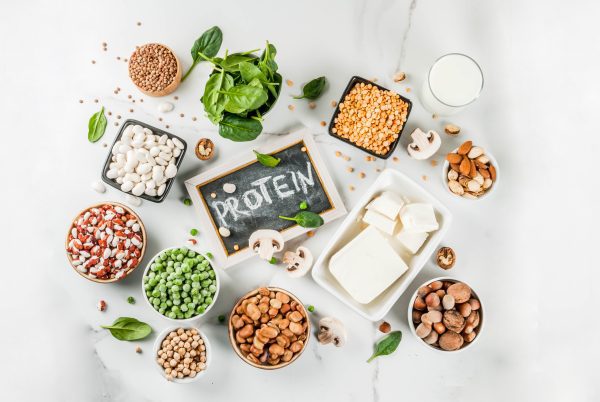Home & Family

All people, whether they are physically active or not, have a dietary requirement for protein. The requirement is actually not for protein but for the amino acids or building blocks of protein.
Protein and Exercise
Proteins perform several important and necessary functions in the body when a person exercises.
- Protein makes up approximately 20 percent of all muscle tissue. Protein is also a vital part of bones, ligaments, and tendons: all tissues that support muscles.
- All the enzymes in the body are proteins. Enzymes are compounds that drive chemical reactions. For example, the chemicals that help produce energy from carbohydrates and fats are enzymes.
- Proteins in blood help control the body’s water balance. Proteins also help transport nutrients to cells and waste products away from cells.
- Antibodies that function in the immune system are proteins.
- Protein acts as a chemical buffer, thus keeping the body from becoming too acidic or too alkaline.
What Are Proteins?
 Proteins are made up of approximately twenty-two amino acids. These amino acids differ in the way they are organized and in the total number of amino acids in the protein. In other words, if proteins are like words, then amino acids are like the letters of the alphabet that make up those words. Amino acids can be grouped into those needed in the diet (essential amino acids) and those that can be found in the diet but also can be made in the body (nonessential amino acids). All proteins contain some essential and some nonessential amino acids. The more essential amino acids a protein contains, the better the quality of the protein.
Proteins are made up of approximately twenty-two amino acids. These amino acids differ in the way they are organized and in the total number of amino acids in the protein. In other words, if proteins are like words, then amino acids are like the letters of the alphabet that make up those words. Amino acids can be grouped into those needed in the diet (essential amino acids) and those that can be found in the diet but also can be made in the body (nonessential amino acids). All proteins contain some essential and some nonessential amino acids. The more essential amino acids a protein contains, the better the quality of the protein.
Average Dietary Requirements for Protein
Dietary protein requirements have been established for lightly active people. This minimum protein requirement is set at about 0.25 grams of protein for each pound of body weight. However, because many people don’t eat what they should, the Recommended Dietary Allowance (RDA) for protein has been set somewhat higher than the minimum requirement. Thus, the RDA for protein is approximately 0.4 grams per pound of body weight. In an average American diet, protein supplies approximately 12 to 20 percent of the calories. This amounts to 60 to 120 grams of protein a day in the typical person’s diet. This amount is well above the RDA for protein for most people.
Athletes’ Dietary Requirements for Protein
 Researchers have studied the protein needs of athletes for several years. Most of these studies found that athletes of all types (aerobic and strength) have somewhat greater protein needs compared with the average person. The protein needs of athletes in these various studies have ranged from 0.5 to 1.3 grams of protein per pound of body weight per day. These values are just above the RDA to about three times the RDA. The usual protein recommendation for athletes is now established at 1.6 grams per pound of body weight each day for aerobic athletes and 0.75 grams per pound for strength and power athletes. See table 1 for the protein needs of various athletic groups.
Researchers have studied the protein needs of athletes for several years. Most of these studies found that athletes of all types (aerobic and strength) have somewhat greater protein needs compared with the average person. The protein needs of athletes in these various studies have ranged from 0.5 to 1.3 grams of protein per pound of body weight per day. These values are just above the RDA to about three times the RDA. The usual protein recommendation for athletes is now established at 1.6 grams per pound of body weight each day for aerobic athletes and 0.75 grams per pound for strength and power athletes. See table 1 for the protein needs of various athletic groups.
Table 1. Protein Requirements of Various Athletic Groups
Note: The protein requirements vary because this information is based on separate studies from different researchers.
| Athletic Group | Protein Requirement* (grams/pound of body weight) |
|---|---|
| Elite weight lifters | 0.6 to 1.3 |
| Strength athletes | 0.6 to 0.9 |
| Endurance athletes | 0.50 to 0.7 |
| Endurance runners | 0.7 |
The protein needs of aerobic athletes (runners, soccer players, etc.) increase because part of the energy used to perform aerobic work comes from protein. Aerobic athletes burn a lot of energy so this increases their protein requirement. The protein needs of strength and power athletes (weight lifters) are frequently greater because of the increase in muscle mass or the needed repair of damaged muscle tissue associated with athletes in these sports.
Influence of Other Factors on Athletes’ Protein Requirements
 While protein needs of athletes may be greater, these needs can increase or decrease depending on several factors. Four of these factors that can greatly influence protein requirements are (1) the total number of calories the athlete consumes, (2) the total grams of carbohydrates consumed by the athlete, (3) the quality of the protein consumed, and (4) the overall training stress on the athlete.
While protein needs of athletes may be greater, these needs can increase or decrease depending on several factors. Four of these factors that can greatly influence protein requirements are (1) the total number of calories the athlete consumes, (2) the total grams of carbohydrates consumed by the athlete, (3) the quality of the protein consumed, and (4) the overall training stress on the athlete.
Calorie Intake. One of the top priorities of the body is to provide sufficient calories to essential body tissues. If calorie needs are not being met, the body will use protein for calorie needs. This will, in turn, increase the protein requirement of the person. Thus, a low calorie intake will increase an athlete’s protein requirement while a high-calorie diet will decrease protein needs.
Carbohydrate Intake. Adequate intake of carbohydrates fuels muscle and brain tissue, sparing the use of protein as a fuel source for muscle and brain tissue. Thus, high-carbohydrate diets often recommended to athletes will reduce the protein requirement of that athlete.
Protein Quality. Some proteins are better at being used for muscle- and tissue-building purposes than other proteins. These proteins are known as high- quality proteins because they contain a lot of the essential amino acids and are easily digestible. Lower quality proteins contain fewer essential amino acids and frequently are less digestible. The consumption of high-quality protein will reduce an athlete’s protein requirement. See table 2 for a list of higher quality and lower quality protein sources.
Table 2. Protein Quality of Some Selected Foods
| High-Quality Protein | Lower-Quality Protein |
|---|---|
| Eggs | Corn |
| Milk | Wheat |
| Meat, fish, poultry | Nuts |
| Soy proteins | Beans, peas |
Training Stress. As an athlete moves to a higher level of training (increased volume or intensity) protein requirements will increase temporarily until the athlete adapts to the new level of training. Thus, protein requirements increase with increased training stress.
Protein in the Diets of Athletes
 While protein requirements may be higher for athletes and other physically active people, most of the time a normal diet will more than cover the increased need for protein. Several studies have shown that many athletes often consume 0.7 to 1.4 grams of protein per pound of body weight each day. Many athletes eat more than 200 grams of protein each day. These amounts are well above the increased daily requirement of protein for most athletes. Many foods consumed by athletes contain ample amounts of protein. See table 3 for some of these foods with their protein content. An athlete who consumes 4 ounces of chicken, 3 cups of skim milk, 1 cup of peas, 4 slices of bread, and 2 cups of spaghetti would be getting 100 to 105 grams of protein. Many athletes eat much more than this in a day.
While protein requirements may be higher for athletes and other physically active people, most of the time a normal diet will more than cover the increased need for protein. Several studies have shown that many athletes often consume 0.7 to 1.4 grams of protein per pound of body weight each day. Many athletes eat more than 200 grams of protein each day. These amounts are well above the increased daily requirement of protein for most athletes. Many foods consumed by athletes contain ample amounts of protein. See table 3 for some of these foods with their protein content. An athlete who consumes 4 ounces of chicken, 3 cups of skim milk, 1 cup of peas, 4 slices of bread, and 2 cups of spaghetti would be getting 100 to 105 grams of protein. Many athletes eat much more than this in a day.
Table 3. Protein Content of Selected Foods
| Food | Serving Size | Protein Content (grams) |
|---|---|---|
| Beef | 3 ounces | 20 to 25 |
| Pork | 3 ounces | 18 to 21 |
| Chicken | 3 ounces | 18 to 24 |
| Fish | 3 ounces | 17 to 24 |
| Beans, peas | 1 cup | 14 to 16 |
| Nuts | 1⁄2 cup | 12 to 18 |
| Grains (rice, etc.) | 1 cup | 11 to 16 |
| Milk | 1 cup | 8 to 9 |
| Eggs | 1 large | 6 to 7 |
| Cheese | 1 ounce | 5 to 7 |
| Bread | 1 slice | 2 to 3 |
Timing of Intake. It probably is of some benefit to the athlete to eat protein several times during the day rather than eat most of the daily protein in one or two large meals. Body protein synthesis occurs throughout the day and having ample protein (amino acids) available at those times makes the synthetic process more efficient. This can be done more effectively by eating protein more often over the course of the day. In addition, some research now suggests that eating small amounts of protein in the hours following a workout may help overall body protein synthesis and recovery.
What About Protein Supplements?
An athlete would probably need to monitor protein intake only during times of calorie restriction. While protein supplements would not normally be needed, inexpensive high-quality sources such as powdered milk and cooked egg whites can be obtained from grocery stores. This would eliminate the need to take expensive supplements offered by many companies.
Edited by Christina Levert, Regional Extension Agent, Sheree Taylor, Regional Extension Agent, and Helen H. Jones, Regional Extension Agent, all with Auburn University. Written by Robert E. Keith, former Extension Specialist.
Reviewed April 2022, Eat to Compete: Sports Nutrition for Young Adults—Protein, HE-0748

